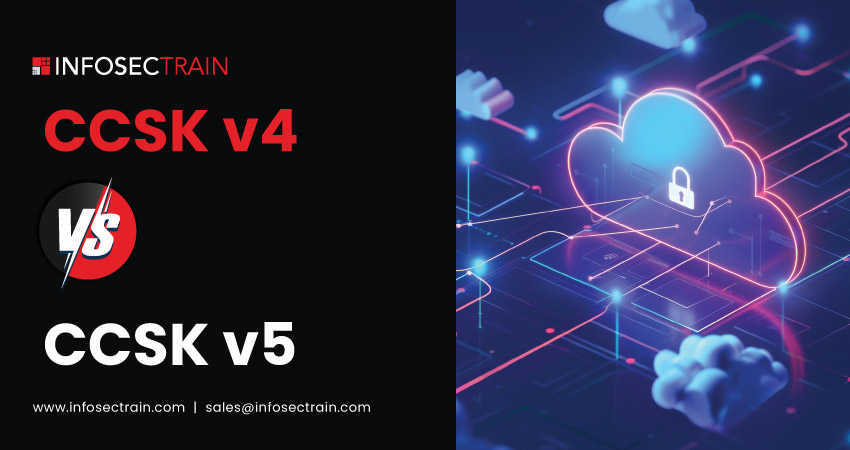CCSK v4 vs. CCSK v5
The Certificate of Cloud Security Knowledge (CCSK) by the Cloud Security Alliance (CSA) has long been the gold standard for cloud security expertise. With the introduction of CCSK v5, significant updates and enhancements have been designed to address the evolving challenges and technological advancements in cloud security. This new version reflects the latest best practices and integrates emerging topics such as AI/GenAI, Zero Trust, DevSecOps, and advanced data security measures.

CCSK v5 expands on the foundational knowledge provided in CCSK v4 by incorporating new domains and topics while also refining and updating existing content. This ensures that security professionals are equipped with the current information and skills needed to protect cloud environments effectively.
Introduction to Certificate of Cloud Security Knowledge (CCSK)
The Certificate of Cloud Security Knowledge (CCSK) validates expertise in cloud security best practices, governance, risk management, compliance, and incident response. It demonstrates proficiency in securing cloud environments, understanding cloud architecture, and implementing effective cloud security strategies, ensuring professionals are well-equipped to handle modern cloud security challenges.
What’s New in CCSK v5?
| Aspect | CCSK v4 | CCSK v5 |
| Total Domains | 14 Domains | 12 Domains |
| New Topics Added | – |
|
| Content Reorganization | Distributed across 14 domains | Consolidated into 12 more streamlined domains |
| Practical Tools | Focused on traditional cloud security tools | Emphasis on modern cloud security tools, including AI and analytics |
CCSK v5 Exam Structure
| Exam Name | CCSK v4 | CCSK v5 |
| Exam Duration | 90 Minutes | 120 Minutes |
| Number of Questions | 60 Questions | |
| Exam Format | Multiple choice questions | |
| Passing Score | 80% Minimum passing score | |
| Exam Language | English, Japanese, Spanish | |
Domain Comparison: CCSK v4 vs. CCSK v5
Green for new additions
Red for removed topics
Blue for renamed topics
Yellow for expanded topics
Collaboration, automation, continuous delivery
| CCSK v4 Domains | CCSK v5 Domains |
Domain 1: Cloud Computing Concepts and Architectures
|
Domain 1: Cloud Computing Concepts & Architectures
|
Domain 2: Governance and Enterprise Risk Management
|
Domain 2: Cloud Governance
|
Domain 3: Legal Issues, Contracts and Electronic Discovery
|
Not Included |
Domain 4: Compliance and Audit Management
|
Domain 3: Risk, Audit, & Compliance
|
| Not Included | Domain 4: Organization Management
|
Domain 5: Information Governance
|
Topics merged into Domain 9: Data Security |
Domain 12: Identity, Entitlement, and Access Management
|
Domain 5: Identity & Access Management
|
Domain 6: Management Plane and Business Continuity
|
Domain 6: Security Monitoring
|
Domain 7: Infrastructure Security
|
Domain 7: Infrastructure & Networking
|
Domain 8: Virtualization and Containers
|
Domain 8: Cloud Workload Security
|
Domain 11: Data Security and Encryption
|
Domain 9: Data Security
|
Domain 10: Application Security
|
Domain 10: Application Security
|
Domain 9: Incident Response
|
Domain 11: Incident Response & Resilience
|
Domain 13: Security as a Service
|
Not Included
(Topics are now integrated across other domains) |
Domain 14: Related Technologies
|
Domain 12: Related Technologies & Strategies
|
CCSK v5 New Topics and Domains in Detail
CCSK v5 introduces several new topics that reflect the latest advancements in cloud security.
- AI/Generative AI: Replaces IoT and Mobile Data to address AI’s critical role in cloud security, including governance and secure handling of AI-generated data.
- Zero Trust: Assumes no implicit trust, ensuring strict authentication and authorization for every access request, minimizing the attack surface in cloud environments.
- Data Lakes: Reflects the importance of managing and securing vast amounts of unstructured and structured data, focusing on governance and compliance.
- Security Monitoring, Cloud Telemetry & Analytics: Enhanced focus on security operations, cloud telemetry, and analytics to improve proactive security measures and incident response.
- DevSecOps: Embeds security practices into DevOps processes, promoting collaboration and automating security testing throughout the software development lifecycle.
- CI/CD: Focuses on automating the build, test, and deployment processes to enhance the security and reliability of cloud applications.
- Serverless/FaaS: Addresses the security challenges and best practices of serverless architectures, including managing permissions and securing function code.
- Resilience: Emphasizes strategies for disaster recovery and business continuity, ensuring robust cloud architectures that can quickly recover from disruptions.
Removed Topics
CCSK v5 removes detailed discussions on certain topics that were covered in CCSK v4:
- Security as a Service (Sec-aaS): This topic has been distributed across several other domains rather than being a standalone focus.
- Detailed Legal and Regulatory Aspects: The coverage of laws and regulations has been reduced to focus more on practical implementation and compliance strategies.
Enhanced and Expanded Content
CCSK v5 places a stronger emphasis on areas that have become increasingly critical:
- Cloud Workloads: Includes a deeper dive into securing cloud-native applications and serverless architectures.
- Governance, Auditing, and Compliance: More comprehensive coverage to help professionals ensure their organizations meet regulatory requirements and best practices.
- Incident Response: Updated to reflect modern strategies and tools for effectively managing and responding to security incidents.
CCSK Training with InfosecTrain
Understanding the differences between CCSK v4 and CCSK v5 is crucial for both current certification holders and those new to cloud security. This comparison highlights the enhancements and new focus areas, providing a clear picture of how CCSK v5 better prepares professionals to tackle contemporary cloud security threats and challenges.
At InfosecTrain, we offer comprehensive CCSK Foundation and CCSK v5 training courses. These CCSK courses provide in-depth knowledge and hands-on experience in cloud security, preparing professionals for the CCSK exams. With expert instructors, practical labs, and up-to-date content, we ensure that participants gain the necessary skills and expertise to excel in cloud security roles and effectively secure cloud environments.







 1800-843-7890 (India)
1800-843-7890 (India)